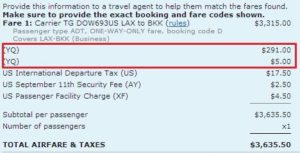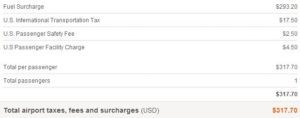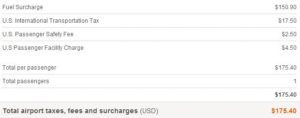MileValue is part of an affiliate sales network and receives compensation for sending traffic to partner sites, such as CreditCards.com. This compensation may impact how and where links appear on this site. This site does not include all financial companies or all available financial offers. Terms apply to American Express benefits and offers. Enrollment may be required for select American Express benefits and offers. Visit americanexpress.com to learn more.
Note: Some of the offers mentioned below may have changed or are no longer be available. You can view current offers here.
Part I Europe
Part II Asia
Part III Africa/Middle East
Part IV Australia/New Zealand
Part V Central/South America
Europe is an absolute award chart bargain compared to Aeroplan’s mileage requirement for Asian travel. After Aeroplan’s summer 2013 devaluation, its award chart for travel to Asia became very expensive relative to other carriers.
Sadly, United’s recent devaluation and Delta’s unprecedented double devaluation brought Air Canada Aeroplan miles in line with the likes of United and Delta. American and US Airways have by far the best pricing for premium cabin travel to Asia, but this post is meant for those lacking those two mileage currencies.
See a Comparison Table of United, US Airways, Delta, and American Airlines Award Charts.
Air Canada charges 150,000 Aeroplan miles roundtrip (75k oneway) for travel to Asia Zone 1 which represents quite a few countries, including Thailand and Vietnam that are normally grouped in a more expensive category with other frequent flyer programs.
Seventy five thousand miles is comparable to United’s new inflated award chart. United charges 70k miles roundtrip for awards flying United’s own BusinessFirst product and 80k miles on Star Alliance partners. Delta begins charging 140k SkyMiles for business class awards to Asia for flights starting June 1, 2014.
Asia Zone 2 encompasses the rest of the continent. An Aeroplan award costs 155,000 miles (77.5k oneway) to the below countries.
There are certain Star Alliance carriers that Air Canada assesses dreaded fuel surcharges. Choosing to fly certain partners could cost over $1,000 per person in addition to the miles!
What are the Star Alliance carriers to avoid when booking with Aeroplan miles? Which are the best to get you to Asia? Are there any fifth-freedom flights you can take advantage of?
As mentioned above, not all Star Alliance carriers are equal when booking Aeroplan awards. Air Canada levies some big fuel surcharges on certain carriers, which you should avoid at all costs. Do note that fuel surcharges are much higher when flying to Europe than Asia. Expect to pay approximately $1,000/person for roundtrip business class to Europe and perhaps $650/person to Asia.
Star Alliance Carriers with Fuel Surcharges
We detailed in the post on Aeroplan awards to Europe how Air Canada annoyingly collects fuel surcharges on their own flights of about $300 one way.
Click on any screen shot to enlarge.
All Nippon Airways (ANA) is another carrier with fuel surcharges of about $300 one way. That’s frustrating, especially because of how great an experience I had flying them from Tokyo to Washington D.C. using US Airways miles.
Flights on Thai Airways also incur fuel surcharges. The cost mirrors the paid ticket fuel surcharge, which can be found with an ITA Matrix search. I flew them from Paris to Bangkok and experienced the awesome Royal Orchid Spa. Needless to say, I will not be flying them on a longhaul Aeroplan award for about $300 each way out of pocket.

Star Alliance Carriers with Low(er) Fuel Surcharges
Asiana flights feature fuel surcharges, but they are approximately half as much as those on Air Canada, ANA, and Thai. A one way from Los Angeles to Seoul will cost about $175 out of pocket, $150 of which is the fuel component. That’s good news because I flew them from Seoul to Frankfurt and had great food and even more attentive service.
Star Alliance Carriers with NO Fuel Surcharges
Luckily, there are a plethora of Asian carriers that do not have a fuel surcharge.
Air China escapes the dreaded fuel surcharge. I’ve written in the past about their excellent premium cabin award availability, so this is great news for both Aeroplan and United MileagePlus members.
EVA Air has an awesome flatbed business class product (check out this trip report for a full write up). Their flights do not have any fuel surcharges when redeeming Aeroplan miles.
Travel on Shenzhen Airlines does not trigger a fuel surcharge. Shenzen doesn’t have any longhaul transpacific flights, but they can be useful when building stopovers on awards to China.
Singapore Airlines award space is almost nonexistent on their Airbus A380-operated Los Angeles <-> Singapore route (with a quick stop in Tokyo). You need KrisFlyer miles to more easily book that flight, especially in a premium cabin. All Singapore flights that are bookable with Aeroplan miles are fuel surcharge-free, though.
Interesting Fifth Freedom Flights with No Fuel Surcharges
Both EgyptAir and Ethiopian Airlines fly between Bangkok and Kuala Lumpur. There are no fuel surcharges when flying either carrier which is great because flying Thai or Lufthansa on this route would trigger a fuel surcharge of about $60 each way.
As mentioned in the section on Europe, Turkish Airways does not have any fuel surcharges. That’s great if flying from their Istanbul hub or adding a segment from Ho Chi Minh City to Bangkok.
United flights only have taxes. You should use United miles for transpacific flights, as the Aeroplan award chart is 5k-7.5k more expensive for flying United metal in business class.
Getting Aeroplan Miles
Aeroplan is a transfer partner of Starpoints and Membership Rewards.
Starpoints
You can earn Starpoints from the Starwood Preferred Guest® Credit Card from American Express and Starwood Preferred Guest® Business Credit Card from American Express.
Both cards offer 25k bonus Starpoints after spending $5k in the first six months. Meet both spending requirements and you’d have 60k Starpoints (50k bonus + 10k for spending), which transfer to 75k Aeroplan miles. Aeroplan often runs promotions in which you get a big bonus for transferring in hotel points. During the last promotion, 60k Starpoints would have become 85k Aeroplan miles.
Membership Rewards
Membership Rewards can most quickly be earned from the American Express® Premier Rewards Gold Card or The Business Gold Rewards Card from American Express OPEN.
Both cards offer huge category bonuses. I especially love the category bonuses on the Business Gold card.
- Get 25,000 Membership Rewards® points after you spend $5,000 in purchases on the Card within the first 3 months of Card Membership
- Built with business-sized purchasing power and fast rewards
- 3X points on airfare purchased directly from airlines
- 2X points on US purchases for advertising in select media, shipping, at gas stations, and made directly from select computer hardware, software, and cloud computing providers
- Up to $100,000 in each category per year, then 1 point
- Use points to entertain clients, reward employees, reduce travel costs, or just offset the everyday expenses of moving your business forward
- Terms and limitations apply
Application Link: The Business Gold Rewards Card from American Express OPEN
Membership Rewards transfers are instant, and you can transfer to anyone’s account. Starpoints transfers take days to post, and names must match between Starwood and Aeroplan accounts.
Recap
Air Canada Aeroplan miles are a good deal for business class awards to Europe but much less so to Asia.
Their award chart to Asia is more expensive than US Airways and American Airlines chart, though Aeroplan allows one way awards for half the price of a roundtrip (something US Airways lacks). Aeroplan awards also have liberal routing rules, so you can include two stopovers or one stopover and one open jaw on roundtrip travel.
After United’s devaluation, it makes sense to book many premium cabin itineraries with Aeroplan miles, as you can save 2.5k-5k miles on business class awards and 22.5k-35k miles on first class awards.
Air Canada assesses fuel surcharges on their own flights and on partners ANA and Thai. Asiana also has fuel surcharges, but they are not as substantial. Avoid these carriers on longhaul flights.
Thankfully, the majority of Star Alliance carriers don’t feature fuel surcharges. There are plenty of flat-bed options when traversing the Pacific, including Air China, EVA Air, and United. You can also add segments on Shenzhen, Singapore or use a fifth freedom route on Ethiopian/EgyptAir without fear of a big cash outlay.
Go back to Aeroplan Fuel Surcharges to Europe
Continue to Aeroplan Fuel Surcharges to Africa/Middle East


















Kinda surprised that the Indian subcontinent is excluded from Asia…
My problem with Aeroplan – apart from the loathsome “fuel surcharges” – is I have no logical way to accumulate those miles. I have better transfer choices for MR and Starpoints, and even if I flew Air Canada (unlikely on a paid ticket) I would definitely credit the miles to United. Now if they came out with a monster credit card offer…
Which transfer partners do you consider better for MR DaveS?
They do have a monster deal! 45k (30k plus 15k referral), no AF first year for a $500 spend on the Aeroplan Gold. Our family’s gotten 5 in the past 3 months.
@Preacher, I wasn’t aware of that. Will look into it.
[…] I Europe Part II Asia Part III Africa/Middle East Part IV Australia/New Zealand Part V Central/South […]
[…] I Europe Part II Asia Part III Africa/Middle East Part IV Australia/New Zealand Part V Central/South […]
[…] I Europe Part II Asia Part III Africa/Middle East Part IV Australia/New Zealand Part V Central/South […]
[…] I Europe Part II Asia Part III Africa/Middle East Part IV Australia/New Zealand Part V Central/South […]
[…] I Europe Part II Asia Part III Africa/Middle East Part IV Australia/New Zealand Part V Central/South […]